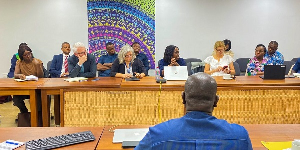 Participants of the Election Working Group meeting
Participants of the Election Working Group meeting
Malicious actors employ sophisticated software, such as deep fakes, to create targeted messages aimed at marginalised ethnic groups to spread misinformation and disinformation, Mary Ama Bawah, a member of the Capacity Building and Awareness Creation Unit of the Cyber Security Authority, has said.
In light of this, the Cyber Security Authority will embark on an extensive cybersecurity education campaign in 32 districts ahead of the 2024 elections.
Ms. Bawah, who said this at the second Election Working Group meeting in Accra, explained that malicious actors use sophisticated software to peddle misinformation and disinformation, hence the need to create awareness to counter the false narrative.
She emphasised the pervasive influence of digital platforms in disseminating false information with ease and underscored the need for proactive measures to combat such threats.
The response strategy of the CSA, she outlined, involved a multi-faceted approach, leveraging collaboration with stakeholders such as the media and law enforcement agencies to swiftly debunk misinformation.
“This approach includes collaborating with tech companies such as TikTok, X, and Facebook to initiate takedowns when necessary and enhancing international collaboration given the borderless nature of cybercrimes,” she said.
The team lead of Fact-Check Ghana at the Media Foundation for West Africa (MFWA), Mr. Kwaku Krobea Asante; the Executive Secretary of the Right to Information Commission (RTIC), Mr. Yaw Sarpong Boateng; and the Executive Secretary of the National Media Commission (NMC), Mr. George Sarpong, also graced the meeting.